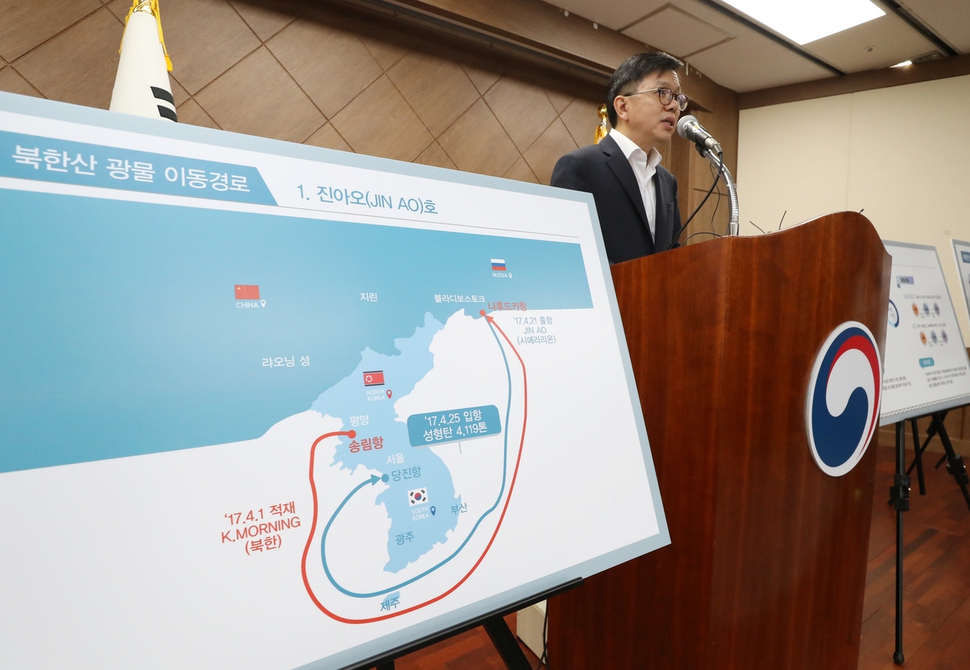 |
|
Korea Customs Service (KCS) Deputy Commissioner Roh Suk-hwan announces the results of the KCS’ investigation of the illegal importation of North Korean coal at the Daejeon Government Complex on Aug. 10. (Yonhap News).
|
Korea Customs Service issues point-by-point rebuttal of LKP’s accusations
Customs authorities issues a point-by-point rebuttal on Aug. 10 on allegations surrounding a case involving the importation of North Korean coal. The Liberty Korea Party (LKP) and conservative media had previously targeted the authorities for charges of failure to handle the North Korean coal importation case – and even charges that they deliberately waited to investigate it.
Why was the investigation so long in coming?
It was Aug. 2017 when the Korea Customs Service (KCS) first obtained information about the disguised importation of North Korean coal. This is the reason behind critics’ charges of “dragging its feet,” with the investigation findings emerging on a year later.
“Early on, there were really only suspicions,” said KCS Deputy Commissioner Roh Suk-hwan while making an investigation announcement on Aug. 10.
“Even the initial intelligence put Russia as the place of origin, so we decided not to pursue it further,” he explained.
According to Roh’s explanation, it simply took a long time to reach the circumstances pointing to an actual crime. KCS sources said the long storage times for coal in Russian ports – up to three months – made it difficult to confirm the same disguised volumes for import. Other factors cited by the KCS included the main suspects denying the charges or delaying their appearances, along with frequent orders from prosecutors for supplementary investigation.
Why were the banks, steelworks, and power plant not included?
Not included in the indictment recommendation were a steelworks and power plant seen as likely to have used the North Korean coal, and two domestic banks suspected of being used for payment. In the case of the coal imports, payment for the intermediary trade was received in kind, with no cash transactions at all. In the pig iron case, a shell company was set up in Hong Kong to issue letters of credit as payment after the disguised importation; the KCS conclude that the bank “could not have been aware” that the process was criminal in nature.
“If there are no charges against the final consumer, they are considered a ‘good-faith third party,’” explained a KCS source on the steelworks’ and power plant’s exclusion from the indictment recommendation – meaning they are not guilty of a crime because they did know the coal or pig iron was North Korean when they used it. But a secondary boycott does remain a possibility for Korea South-East Power, one of the North Korean coal users.
“My understanding is that the US’s independent sanctions are typically applied in cases of repeated and systematic violation and evasion of sanctions, where the presiding country is deemed to not be conducting an adequate investigation,” a KCS official said, indicating that the changes of a secondary boycott are low.
Lax customs clearance procedures?
Addressing the immediate clearance of the suspected North Korean coal by customs officers, the KCS explained, “Based on the level of intelligence, it would not have been possible to conclude that the coal is North Korean and delay customs clearance.” In the absence of sufficient objective data, the typical practice is to permit customs clearance first and conduct an investigation afterwards, the service said.
Responding to charges that its after-the-fact measures were “inadequate,” the KCS said the coal “could not be confiscated because it had already been used by the final consumer, which had acquired it in good faith.”
Why weren’t the ships detained?
The KCS also responded to remarks about its failure to detain vessels carrying the North Korean coal.
“If a relevant agency reports vessels with suspected linkages to North Korea, we conduct searches each time they come into port. The seven vessels at issue here were not subject to that,” it said.
Customs authorities explained that the vessels in question had main arrival and departure points in Japan and China, and with steel and steel plates as their main load, there was no reason to suspect them.
Appropriate measures against the vessels in violation of UN Security Council resolutions are anticipated after the investigation. A Ministry of Foreign Affairs official present at the press conference the same day announced plans to “report the investigation findings to the UNSC’s North Korea sanctions committee.”
“The question of whether to include the vessels on the UNSC sanctions list will be decided according to the gravity of the cases,” the official said.
“The South Korean government also plans to place its own ban on domestic entry for the vessels in question.”
By Lee Jung-gook, Cho Kye-wan and Bang Jun-ho, staff reporters
Please direct comments or questions to [english@hani.co.kr]








